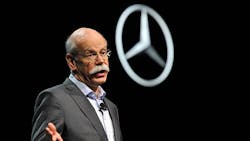FINANCIAL ROUNDUP: Daimler Profits Spike 89% for First Quarter
FRANKFURT, Germany – German auto group Daimler, maker of Mercedes-Benz, said Tuesday it got off to a good start in 2015, with sales and profits rising strongly in the first three months.
“We made a very good start to the year 2015 and continued along our successful path with record levels of unit sales, revenue and (operating profit) in the first quarter,” said chief executive Dieter Zetsche. “Our growth strategy, our product offensives and our efficiency programmes are paying off. We have already achieved a lot, we look to the future with great confidence, and we aim to achieve even more.”
In the period from January to March, net profit surged by 89% to 2.05 billion euros, about $2.2 billion. Underlying or operating profit grew by 63% to 2.906 billion euros on a 16% increase in revenues to 34.236 billion euros, about $36.7 billion. Daimler said it expects revenues to increase “significantly” in 2015.
PANASONIC: TOKYO – Japanese electronics giant Panasonic said Tuesday that its annual profit soared 49%, with strong results at its lesser-known auto parts unit and lower costs linked to a sweeping restructuring boosting its bottom line.
The Osaka-based firm’s earnings for the fiscal year to March surged to 179.49 billion yen, about $1.5 billion, although revenue edged down 0.3% to 7.7 trillion yen, about $64.3 billion.
The upbeat figures underscore how Panasonic’s shift to focus on lesser-known businesses, including an energy and auto division, has helped its finances, and made it a standout as rivals Sony and Sharp continue to struggle.
HONDA: TOKYO – Honda said Tuesday that its fiscal-year net profit fell 8.9% to $4.4 billion as Japan’s number three automaker grapples with soaring recall costs, including from an exploding airbag crisis linked to at least five deaths.
Honda downgraded profit forecasts twice before its results were published, warning the airbag scandal at supplier Takata would take a toll on its bottom line, as well as falling demand in Japan and the world’s biggest vehicle market, China.
The company said it earned 522.7 billion yen, about $4.4 billion in the year through March -- worse than its most recent estimate of a 545 billion yen profit -- while operating profit dropped 13% to 651.6 billion yen, about $5.5 billion. Annual sales rose 6.8% to 12.6 trillion yen, about $106 billion.
NEC: TOKYO – NEC said Tuesday its fiscal-year net profit jumped nearly 70%, boosted by a weaker yen and growth in its public-sector infrastructure business.
The information technology company said net profit for the year to March came in at 57.3 billion yen, about $480 million, while operating profit rose about 21% to 128.1 billion yen, about $1.07 billion.
Revenue slipped 3.5% to 2.9 trillion yen despite steady growth in its public-sector business, including the rollout of systems for field communication as well as radio systems for firefighters, as Tokyo pumps cash into updating Japan’s creaking infrastructure.
PHILIPS: THE HAGUE, Netherlands – Dutch consumer goods, healthcare and lighting giant Philips revealed Monday a 27% first quarter plunge in net profits despite a rise in sales over the same period a year earlier.
Philips said net profit slackened to 100 million euros, about $105 million, on increased sales of 5.3 billion euros, about $5.57 billion, during the first three months of the year compared with the first quarter of 2014.
That 14% jump in turnover was fuelled by a 10% surge in sales by its consumer goods and lifestyle unit. But that advance slimmed to only 2% in comparable terms, once changes in business environment were factored in.
HTC: TAIPEI, Taiwan – HTC on Tuesday provided a forecast of lower-than-expected revenue in the second quarter after a disappointing launch of its new model, as the smartphone maker struggles to compete with major rivals like Apple and Samsung.
HTC predicted sales of between Tw$46 billion and Tw$51 billion – about $1.35 billion and $1.65 billion, respectively – in the three months to June. That is up from Tw$41.52 billion, about $1.22 billion, in the previous quarter, but down up to 30% from Tw$65.06 billion, about $1.91 billion, a year ago.
The figures prompted analysts to lower their outlook for the company, despite the launch of its HTC One M9 in Taiwan last month after a week-long delay due to a software upgrade.
About the Author
Agence France-Presse
Copyright Agence France-Presse, 2002-2025. AFP text, photos, graphics and logos shall not be reproduced, published, broadcast, rewritten for broadcast or publication or redistributed directly or indirectly in any medium. AFP shall not be held liable for any delays, inaccuracies, errors or omissions in any AFP content, or for any actions taken in consequence.
